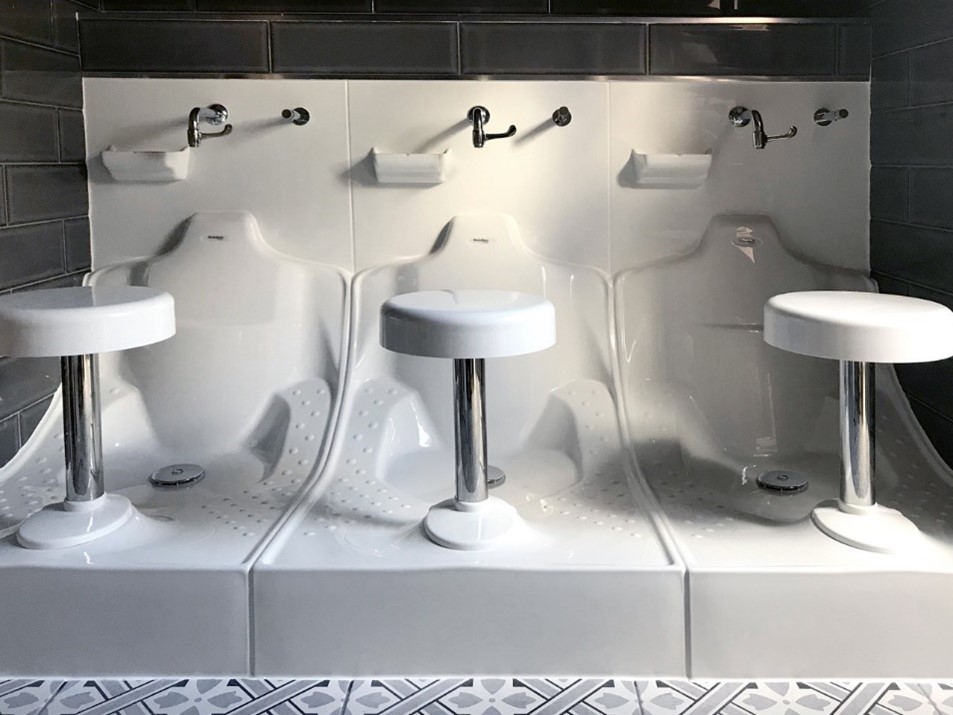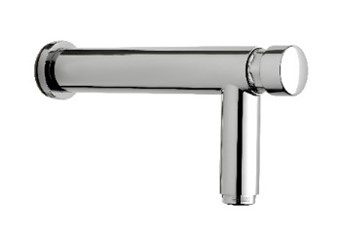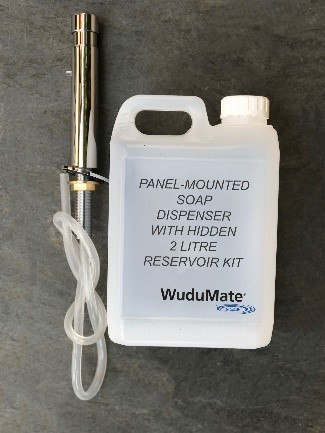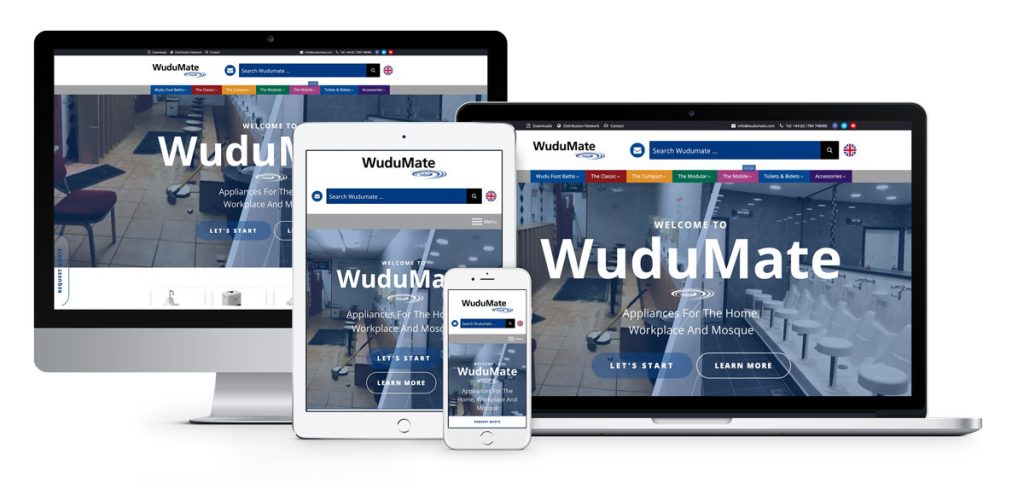We are pleased to share a video of the WuduMate Mobile demonstrating how the WuduMate Mobile can be used where its easier to take the wudu facility to the people rather then the people to the wudu facility
This Birmingham secondary school was situated in an area of higher population density and higher percentage of ethnic minorities than the city averages. At the time, it was seeing good academic progress from the pupils, and this has continued in more recent years.
The improvement in academic performance was accompanied by an extensive refurbishment program. During this process, one of the new initiatives included the redevelopment of the ablution facilities – an area used by Muslim students before prayer. Another initiative was a redesign of the toilet areas to combat bullying.

For the ablution areas, project managers Lendlease suggested installation of WuduMate washing appliances specifically designed for Wudu. After advice from the manufacturer a series of WuduMate Commercial units was chosen, this model having already been successfully implemented in hundreds of similar environments. Eight units were installed in the male ablution area and four in the female facility.
“We were keen to adopt a long-lasting solution using latest generation materials to facilitate cleaning and reduce maintenance” said the project manager. “The WuduMate has proved to be far easier to implement that the construction of a traditional tile and cement trough and is being well received by those using it.”
The deputy head teacher was delighted with the decisions to install WuduMate ablution appliances and to create more open plan toilet areas, saying that staff and students alike were showing pride in the new facilities and feeling that the school had set a standard for others to follow.
The WuduMate Commercial was one of our original WuduMate footbaths, designed by our founder Nigel Bromilow.
We no longer sell this model - it has been superseded by the WuduMate Classic, an improved footbath design, updated after feedback from our users.
Located just south of Central London in the United Kingdom, Gatwick Airport has been in use since the late 1920s. Passenger numbers reached a peak of 46.6 million in 2019. At the time of the WuduMate project in 2013 there were already more than 34 million passengers passing through the airport on their way to over 190 destinations with more than 70 different airlines.
With a chaplaincy team in place since 1974 and a chapel opened two years later, Gatwick Chaplaincy has been serving tourists, business travellers and Gatwick Airport’s own staff for well over 35 years. Now very much a multi-faith chaplaincy, the move to provide inclusive facilities for practising one’s faith was spearheaded by Anglican chaplain Canon Jonathan Baldwin.
Through his many conversations with Muslim colleagues and chapel visitors over the years Canon Baldwin became aware of a need for suitable Wudu facilities.
A contractor was appointed to develop a new multi-faith area in the South Terminal and, with direction from the chaplaincy team, installed the WuduMate Commercial to support the airport’s Muslim staff and visitors. The contractor found it was the most appropriate solution on the market – easy to install and no need to dig into the floor slab to accommodate a tile and cement trough. With the completion of this project, Gatwick airport was now clearly capable of welcoming and accommodating ever-increasing diversity in its passengers and personnel.
“The general feeling was that the Wudu facilities would be popular, but until Hajj, we didn’t really appreciate how much they were needed,” said Canon Baldwin.
Footfall into the chapel was much increased and a further multi-faith room was later opened in the North Terminal.
Download a PDF of this case study
The WuduMate Commercial was one of our original WuduMate footbaths, designed by our founder Nigel Bromilow.
We no longer sell this model - it has been superseded by the WuduMate Classic, an improved footbath design, updated after feedback from our users.
The Royal Cornwall Hospitals NHS Trust is the principal provider of acute care in Cornwall. It serves a population of around 430,000 people, a figure which is greatly increased by holidaymakers during the summer months.
The Royal Cornwall Hospitals NHS Trust employs approximately 5,000 staff with a mix of ethnicities and is committed to providing the best possible facilities in order to attract and retain its highly skilled teams of doctors, nurses and other health professionals.
A facility valued by the Trust’s Muslim staff is the purpose built WuduMate ablution facility provided by the Chaplaincy. It was specifically designed to enable Muslims to undertake their Wudu washing ritual before prayer in a safe, comfortable and dignified environment.
Before installation of the WuduMate, the only facilities for washing were inadequate and not considered suitable by the Trust for its staff.
The WuduMate facility is available for all to use, including visitors and patients, although has predominantly been used by staff.
The Trust’s Lead Chaplain Reverend Mark Richards was delighted with the feedback he received. “With the addition of the WuduMate we can now offer 21st Century facilities for one and all. We have received a positive reaction from everyone concerned. Undoubtedly the facility is a tremendous enhancement to the spiritual centre of the Trust” he said at the time.
A Muslim doctor expressed his gratitude to the Trust for providing the WuduMate and the local MP until 2019, Sarah Newton, was also impressed. She said “It’s important that we recognise the ethnic mix of the population...and the multi-faith facility in the Royal Cornwall demonstrates excellently how appropriate facilities can easily be provided."
Visit website: www.rcht.nhs.uk
The London office of a leading blue-chip US based financial institution extended its multi-faith facilities in two Canary Wharf buildings to include ablution appliances specifically designed for Muslims to perform their pre-prayer wudu washing ritual.
The two buildings were managed by Norland Managed Services, a leading provider of managed building services in the UK. Norland’s Property Manager at that time was becoming increasingly concerned about the health and safety implications of water being spilt in the washrooms servicing two of the trading floors.
He realised that some of the issues identified in the WuduMate publication Diversity Matters, a Guide to Best Practice Multi-Faith Room Design, could well be the cause of the high level of water spillage.
After a consultation process between Norland and a group of their client’s Asian staff, it soon became clear that whilst multi-faith rooms had already been established in each building, they had not been equipped with appropriate washing facilities for those Muslims wishing to undertake their daily prayer ritual which included the washing of their feet.
Norland’s mechanical and electrical contractor was asked to contact The Specialist Washing Company, now trading as WuduMate, and after considering the various options, chose the WuduMate Compact ablution appliance, as the most appropriate foot-washing appliance for the limited space available.
Norland’s Property Manager said
“Many of our clients have a typical, modern day, ethnically diverse workforce, and we need to keep abreast of innovative new products which help provide for this fast-changing makeup of our society. The Specialist Washing Company were extremely helpful when we contacted them, immediately able to relate to our issues, and this helped us to quickly provide an ideal solution to this sensitive issue.” He added “In hindsight, it would have been easier if the WuduMates had been included in the buildings’ original designs, and in the future, we would encourage this."
Ismail Mahmood is a regular visitor to the Multi-Faith Room in his building and adds
“I believe I can speak for all of us who work here and use the WuduMates, when I say that this excellent facility differentiates this building from many others in the City where suitable appliances are rarely available in which we can safely and comfortably perform our Wudu, which requires us to wash our hands, face and feet before prayer; a big thank you from all the Muslim staff who work here!”
Buckley Hall was the fourth contracted out prison in the UK, and the first privately managed Category C establishment holding medium security prisoners. Originally a men’s prison, it changed to a closed female training prison in 2002. Three years later the decision was made to revert Buckley Hall to a male Category C prison, with the new prisoners beginning to arrive on December 5th, 2005.
It was recognised at this time that within the male prisoner population there would be a higher percentage of Muslim prisoners than had been the case when Buckley Hall had been a female establishment. An increased Muslim inmate population would require improved facilities for obligatory ablution before prayer to avoid both the otherwise inevitable water spillage and the misuse of and potential damage to basins not designed for this ablution ritual.
Buckley Hall has a diverse, multi-faith chaplaincy team providing services and support to prisoners. As a specialist manufacturer of prayer room and Wudu facilities, The Specialist Washing Company now trading as WuduMate were asked for their advice by the prison Chaplain, following recommendation by another HM Prison.
It was subsequently decided to install a WuduMate ablution appliance within the multi-faith chapel. This range of appliances are specifically designed to accommodate Wudu without spillage or waste of water, thus avoiding the health and safety issues associated with prisoners having to wash their feet in washbasins or other unsuitable receptacles. The prison facilities department also chose an electronic automatic tap unit so that water would be automatically dispensed when required, negating the need for accessories which could be easily damaged.
The chaplain at the time said that the ablution appliance had been successfully operating since installation and well received by inmates. It had negated the need to make use of unsuitable receptacles for Wudu, enabling quick and effective ablution. He thought it had proved to be a robust and secure device, ideally suited to the environment, with no cavities in which to secrete illegal items or substances. Its high-quality appearance was thought to contribute to respectful use by the inmates and he was hopeful that this would help minimise the incidence of misuse and damage in the future.
Located in Small Heath, an area of Birmingham where around 70% of the population is Muslim, this school had a young and enthusiastic team and colourful and vibrant décor throughout.
The school was committed to an environment where bullying is seen by all to be unacceptable and where courtesy and good manners are promoted. Responsible behaviour was expected, and achievements recognized with awards and certificates.
As in the surrounding area, the school population was predominantly Muslim, and it was recognised that there were inadequate facilities in which Muslim pupils could perform their ritual ablution before prayer. The site manager at the time Gulfor Khan was tasked with assessing the situation.
”We realized that we had insufficient Wudu facilities for the many Muslim pupils within the academy, and so identified several areas with sufficient space and access to plumbing and drainage. Our next challenge was to identify suitable appliances for each location, and fortunately we were introduced to the WuduMate range by another local school who had recently undertaken a similar project. The WuduMate range consists of several models, giving us the flexibility to choose appliances to suit both the application and the spaces we had available.”
A local plumbing contractor was appointed to undertake the installation of a series of WuduMate Compact ablution appliances in the boys’ and girls’ changing rooms. Gulfor Khan added
“The Specialist Washing Company (now trading as WuduMate), reacted quickly so we could undertake the installation over half term, and met with the contractor on site to help determine the most appropriate WuduMate models to use.”
The subsequent installation proved to be a great success, with the WuduMate Compacts being excellently received by all who used them.
To assist you in this task, please find detailed below the features and benefits of the Wudumate Modular.
As the name Modular would suggest, the WuduMate modular can be installed singly or fitted together in series, to provide a single, waterproof fixture for communal ablution, with as many washing positions as can be fitted in the space available.
Each WuduMate Modular unit is 700mm (27 inches) wide.

In some parts of the world, specifically South East Asia, standing wudu is preferred to seated wudu, and this preference seems to be on the increase in the West, especially for those dressed in western attire who may have to return to the office after salat.
Whilst the WuduMate Modular is generally installed with a stainless steel seat pole and seat top for seated wudu, the WuduMate Modular also includes a compatible alternative which is a Modular configured without a seat for those who prefer to perform their wudu standing.
The availability of standing positions for wudu can only broaden the appeal of a mosque to those who might prefer to stand rather than be seated.
When the WuduMate Modular is configured for standing wudu, it can also be used for wheelchair access, by setting the units into the concrete slab, and tiling up to the back of the WuduMate. Installation of even a single standing unit in a row of seated units, will help meet DDA (disability) compliance.
The shape of the WuduMate Modular, combined with the location of the spout and the angle of the spout, is designed to provide both the most comfortable position for wudu, but importantly to also minimise splashing of grey water on the person performing wudu or his/her clothes.
Whilst tap/faucet preferences vary (sensor /manual etc) WuduMate is proud of its water management features, which include a number of significant water saving options with every WuduMate model.
The Neoperl 1.8 lpm PCA aerator (0.5 US Gallon) is also available as an option for each tap which potentially halves the water usage, and thus halve the cost of the water itself but also reducing the cost of heating the water.
There are a number of other water saving devices available with each WuduMate model, although some of these do negate the aerator benefits outlines above. (Refer section Water savers below.)
The recommended installation design of the WuduMate Modular using a shallow stud wall (framework) with shelf top, makes it possible to easily install several different type of taps/faucets, using the cavity of the framework to store the plumbing.
The most widely used WuduMate Modular tap is the WuduMate ¼ turn Wall-Mounted Tap. This tap/faucet requires a single source of premixed water, either mixed by a TMV (Thermostatic Mixing Valve) or provided centrally; water flow is controlled by a ¼ turn on/off mechanism located at the end of the spout.
Benefits of the WuduMate ¼ turn tap include:-

The WuduMate non-concussive (time delay) tap/faucet is operated by a push-button on the end of the tap/faucet, giving a 7 second supply of water prior to requiring another push for a further 7 seconds and so on. Non concussive taps can misbehave when water quality is poor, so installation of an in-line filter is recommended with each tap/faucet.
Non-concussive taps are intended to save water, but if a tap malfunctions there is a risk of water running uninterrupted, and if wudu is finished after 3 seconds of a 7 second run, 4 seconds of water would be wasted. Water saving claims should therefore be treated with caution.

Like all auto sensor taps, the benefits of the WuduMate Wall Mounted Auto Sensor Tap/faucet are well documented; in theory the 7 second on/off water cycle should help save water and all auto sensor taps have hygiene benefits in so much as it is not necessary to physically touch the tap/faucet to turn the water on/off. All sensor taps are however considerably more expensive than manual taps, and may well require maintenance over their expected life span, especially if mistreated as they can be by some (e.g. children sticking gum on the sensor to ensure continued running).
A number of materials could be considered for manufacture of a communal ablution facility:-
When we first reviewed what materials were traditionally used for building communal ablution areas, tile and cement was by far the most common, and probably still is. We experimented with ‘solid surface’ (Corian like material) and considered stainless steel which we found was expensive and dangerously slippery.
After careful evaluation of material options, high-quality sanitary grade acrylic was deemed to provide the most benefits for the WuduMate Modular:-
Acrylic is a material which is widely recognised as ‘best practice’ for washing appliances, with its shiny surface facilitating cleaning, reducing maintenance and helping to reduce the incidence of bacteria that spreads foot-borne diseases.
Not only is acrylic easy to keep clean using normal household detergents, it also has the benefit of showing when cleaning is required. When unclean, acrylic loses its sparkle, helping users instigate an appropriate cleaning regime to combat unwanted bacteria, which can otherwise lie unnoticed in tile and cement structures where dirt and bacteria is not easy to see.
Some have questioned whether acrylic is strong enough to support the weight of a large person performing wudu, thus the WuduMate Modular seat is supported by a steel frame, to ensure that the weight on the seat is directed through to the floor rather than onto the acrylic of the unit itself, thus supporting the heaviest of users. The WuduMate Modular seat system has been tested by CERAM (wwww.ceram.com) for weights up to 500kg.
Individual traps/wastes improve hygiene and reduce unpleasant odours. The fundamental design of a ‘trough’ based ablution unit, dictates that each person’s ‘grey water’ runs in front of those ‘downstream’, increasingly considered unhygienic, and prone to produce unpleasant odours.
WuduMate have standardised on the UKs leading drain manufacturer MacAlpine, to ensure that the WuduMate installation is of highest quality with minimal maintenance requirements.
The WuduMate Modular Seat poles are manufactured from high quality stainless steel, to avoid rust and to be long-lasting. Twin-walled black or white acrylic seat tops provide an easy to clean, resilient seat, the new aluminium tops in silver and gold are increasingly popular, and the beech option with chrome trim is another cost effective option to consider.
The WuduMate Modular seats can be located in a forward position for children’s use, or with the pole located at the back of the mounting area for adult use.
To hold the seat poles firmly in place, the seat pole is supported by a sturdy steel structure under the WuduMate which sits on the substrate (floor base) under the WuduMate. This combination transfers the weight of the person seated on the WuduMate seat, directly to the floor rather than onto the surface of the WuduMate.
To help keep the seat pole base clean and disguise the fixings holding the pole in place, there is an optional seat pole base cover, manufactured in sanitary grade acrylic to match the colour of the seat top, whether Black or White.
Optional, integrated soap dispensers improve hygiene, reduce waste and minimise shelf and wall clutter.

Generic decoration (decal patterns) are available in a number of colours and standard designs, to give aesthetic appeal to the WuduMate; alternatively customisable patterns can be produced, perhaps to complement patterns used elsewhere in a mosque such as a ‘frieze’ around the outside of a building.
High quality white acrylic provides opportunities for imaginative downlighting to increase aesthetic appeal of the ablution area, extremely effective when used in conjunction with mirrors.
The WuduMate Modular should ideally be installed against a wooden/steel frame fixed to the wall, with a minimum gap of 100-120mm depth, sufficient for a plumber’s access when required for maintenance. This framework provides a number of benefits:
Whilst there can be a reluctance from some to implement a modern, state of the art ablution system in favour of a traditional trough system, our experience tells us that the benefits provided by the WuduMate are becoming increasingly important to many, especially the younger generation and young professionals who are used to bright, well lit, more hygienic environments at home.
As more and more of us have access to modern bathroom facilities at home and at work, there is increasingly an expectation that an ablution environment in the mosque should be of similar quality, hygiene, and overall aesthetic appeal as a bathroom at home. Visitors to mosque ablution areas perform wudu as a ritual cleansing, and should not be put at risk of leaving an ablution area with more harmful bacteria on their feet than when they arrived. With the ready availability of the WuduMate Modular, there is no longer a reason why this should be the case.
You can find technical specifications and an installation guide for the Wudumate Modular here
Please contact us on info@wudumate.com or fill in our Contact form if you have any questions about this product or any others in our range
We are proud to launch our new website!

Having plenty of space in the Wudu area, this Modular user in the USA has made elegant use of a cement ‘filler’ to add space between the WuduMates in their men’s ablution area.
The WuduMate Modular foot baths are designed to fit snugly together to form a single unit, but this is an innovative solution if the users need additional space.